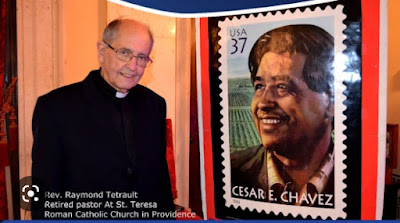Early advocate for immigrants and relentless fighter for the poor
By Will Collette
Cathy and I first met Ray Tetrault almost exactly 50 years ago when we walked a picket line in front of a Providence Almacs to support the United Farm Workers lettuce boycott. The UFW had just launched the lettuce boycott after the successful grape boycott forced growers across California to recognize the union and sign contracts.
It was a lively picket and I remember Ray taking his turn with
the megaphone, calling out the chants and songs. Over the next decade, I saw
Ray frequently at planning meetings, events and of course on the picket line.
Ray Tetrault grew up in South Providence near St. Michael’s
Church and was one of a large cadre of activist priest, nuns and brothers, some
in the church and some, like Ray’s friend Henry Shelton, expelled from holy
orders.
In those days, many Catholics believed in what was then called
“liberation theology,” a principle that grew out of Pope John XXIII’s Vatican
II conference that the church had the duty to stand with the poor and oppressed.
Imagine for a moment, the political philosophy of Bishop Thomas Tobin. Now
think of the exact opposite, and there you have Ray.
I wasn’t a Catholic, though I worked for the Catholic Church’s
Community Affairs office on strategic campaigns in the 1970s. But you didn’t
need to be a Catholic to admire and respect Ray and his colleagues, including
Henry Shelton, Sr. Adelaide Canelas (her specialty was organizing Portuguese immigrants),
Fr. Jim Ford and many others.
Ray’s particular contribution was to recognize the needs and
potential of the growing number of Spanish immigrants. He was the first priest in
Rhode Island to say the Mass in Spanish. I remember Ray and Sr. Canelas working
a tandem act at large events, each with a bullhorn to translate English
speeches into Spanish and Portuguese respectively.
One of the hallmarks of great activists is their devotion to
developing new leadership and inspiring others to stand up and fight for their
rights. Ray was as good as the best organizers at doing just that within the
immigrant community, as the Providence
Journal article on his passing shows in detail.
His legacy lives on in the actions of the generations of
people he inspired.
